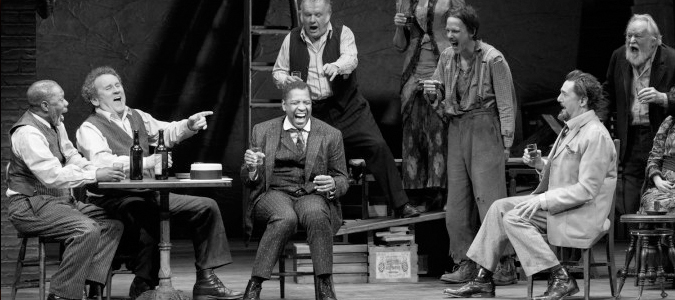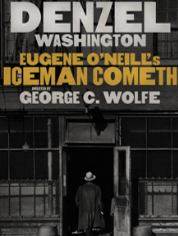

The Iceman Cometh (2018)
Opening Night: April 26, 2018
Closing: June 17, 2018
Theater: Bernard B. Jacobs
Denzel Washington, two-time Academy Award® winner and Tony Award® winner, returns to Broadway in one of the signal roles in the American theatre in Eugene O’Neill’s The Iceman Cometh, for 14 weeks only. Frank Rich of The New York Times raved, “the word ‘masterwork’ is not invoked lightly. Eugene O’Neill’s tragic vision remains undiminished by time. The Iceman Cometh is a ferocious American classic that has lost none of its power to send one shaking into the middle of the night.” Beginning March 22, 2018, Denzel Washington, fresh off his extraordinary sell-out runs in both Fences and A Raisin in the Sun, comes back to the Main Stem in “the greatest American play” (New York Magazine) by “the greatest American playwright” (The Washington Post). Five-time Tony winner George C. Wolfe directs this strictly limited engagement.
BUY TICKETSREAD THE REVIEWS:
April 26, 2018
The surest way to get as pickled as the self-deceiving regulars at Harry Hope’s downtown New York dive bar in The Iceman Cometh would be to take a shot of whiskey every time someone says “pipe dreams.” Eugene O’Neill was seldom one to go easy on emphatic repetition of his themes, and the playwright’s bleak vision of men drowning their deferred plans in cheap booze can be as prolix as it is poetic. George C. Wolfe’s revival feels on some levels like it’s still cohering, the underlying despair remaining muted for too much of the three-hour-45-minute running time. But it comes together in a powerful final act driven by the searing confessional monologue of Denzel Washington’s Hickey. There’s a symphonic quality to this brawny four-act 1946 drama, with its flavorful early 20th century New York vernacular and its cast of 17 major characters all doing their best with their big talk to fool themselves about the hollowness of their stalled lives. Wolfe has assembled a talented ensemble, almost all digging deep into their characters. Their individual stories have a unique music as they blather on about a past that was probably never quite what they claim, and a future that they refuse to concede is fermenting in the bottom of a glass. The production perhaps could have used a longer preview period, since the choral aspect of the performances is still one step behind the solo work. But it’s compelling enough to suggest the ideal balance will come.
READ THE REVIEWApril 26, 2018
With his buoyant air of all-American optimism and innate decency, Denzel Washington is well cast (by helmer George C. Wolfe) as Hickey, the long-awaited bearer of false hope, comforting lies, and unlimited free booze to the washed-up losers who patronize Harry Hope’s no-hope saloon. When the thesp sweeps down the aisle and onto the stage wearing a snazzy suit and a 100-watt smile, the whole theater warms up. The huge ensemble cast (19 strong) presents a cross-section of some of the best character actors in the business. At center stage is the saloon keeper Harry Hope, played with worn-out Irish dignity and a bit of a warm brogue by Colm Meaney, who generously treats his bedraggled patrons to free drinks and lets them sleep it off in their chairs. (As one drinker notes, it’s living hell to crawl upstairs into a cold and lonely bed.) It’s 1912 in New York City, a hard place to survive when you’re down and out. But this shabby neighborhood bar is a safe refuge from the bustling, terrifying street life. Santo Loquasto has designed the room with a dusty, but well-stocked bar that has seen better days. There’s some nice woodwork over the bar, but it’s obviously coated in many years’ worth of nicotine stain. The rest of the furnishings are spare and decidedly spartan — hard wooden tables and chairs and not a cushion in sight. As for the stairs leading upstairs to the furnished rooms, they look as if they turn on themselves at the landing and lead straight down to hell. Jules Fisher and Peggy Eisenhauer have done a remarkable job with the stygian lighting design, casting this depressing mausoleum in every shade of black, brown, and grey.
READ THE REVIEWApril 26, 2018
If you have a good time at a production of “The Iceman Cometh,” does that mean the show hasn’t done its job? I was beaming like a tickled 2-year-old during much of George C. Wolfe’s revival of Eugene O’Neill’s behemoth barroom tragedy, which opened on Thursday night at the Bernard B. Jacobs Theater, with Denzel Washington more than earning his salary as its commanding star. A sustained grin may not seem an apt response to a play in which desperate, drunken denial is the given existential condition, and suicide and murder are presented as perfectly reasonable life choices for anyone who sees the world clearly. Besides, to smile through nearly four hours of doomed rotgut-soaked souls mouthing the same hopeless blather over and over again would appear to be courting lockjaw, if not temporary insanity. Surely, the more appropriate response and customary behavior for an “Iceman” audience member would echo that of the play’s cynic-in-chief, a disenchanted socialist (played here with ashen anger by David Morse), who says, “I took a seat in the grandstand of philosophical detachment to fall asleep observing the cannibals do their death dance.”
READ THE REVIEWApril 26, 2018
The curtain raises to reveal a dingy saloon tableau: An assortment of barflies, in various states of collapse, are lit in the chiaroscuro of a Dutch master painting, letting us know that for the next few hours, we’ll consider the beauty in the bleak lives of dese bums. Residents of a Greenwich Village bar in 1912, they first appear as motionless as arcade automatons before anyone has dropped a penny. Then, one by one or in pairs, the anarchists, the retired officers still at war, the prostitutes and their pimps offer us hints of the wrong turns that led to this last-ditch watering hole. Today they are waiting for the annual return of Theodore “Hickey” Hickman, a traveling salesman who can be counted on to buy a round and cheer them with oft-told stories, including the gag about catching his wife with the iceman. Only when he at last sweeps in does the company become fully animated, though they will soon be disappointed to learn that their pal is off the sauce and appears to have come to dash their improbable dreams of a future beyond the saloon doors. Let’s get this party started! With seven hours of angels and five hours of wizards to take in on Broadway this season, can a case be made for four hours of end-of-the-line drunks? Yes, and a good one. The Iceman Cometh, Eugene O’Neill’s frequently revived dark meditation on the life-sustaining merits of self-delusion, is in good hands with this latest creative team led by director George C. Wolfe. (That stunning tableau is thanks to lighting designers Jules Fisher and Peggy Eisenhauer; costumes are by Ann Roth and scenic design, Santo Loquasto.)
READ THE REVIEWApril 26, 2018
Well before Denzel Washington’s glad-handing salesman Hickey makes his fateful arrival in the dive bar of George C. Wolfe’s strong new Broadway staging of The Iceman Cometh, Eugene O’Neill’s collection of pipe-dreaming drunkards arrange themselves across their end-of-the-line cafe as if modeling for Leonardo’s “The Last Supper.” All that’s missing is a savior. Truth be told, O’Neill’s rum-bums need their messiah a lot more than this production does: Though certainly built around mega-star Washington, this Iceman (at the Bernard B. Jacobs Theatre, with Scott Rudin leading a large producers team that includes Barry Diller, James L. Nederlander and Jason Blum) is so well-cast and performed by, among others, David Morse, Bill Irwin and Tammy Blanchard, that Washington’s late, happy-dance entrance almost seems a worry. Is something delicate about to be knocked off balance?
READ THE REVIEW






















